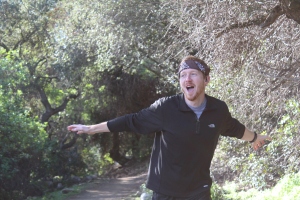I was never a fan of flossing growing up. Although I had the good fortune to have nearly perfect teeth (thanks, mom and dad), my gums have always been on the sensitive side, so flossing is an unpleasant task. When we moved to Santa Barbara, I switched dentists and have been enduring regular lectures at my cleanings about improving my flossing habits ever since.
Here’s what I’ve learned about flossing over the past year:
- It’s not just for after you eat popcorn or celery.
- It hurts, and it will make you bleed.
- If you don’t keep doing it, it keeps hurting.
- Not flossing can result in cavities in the impossible-to-reach-with-a-toothbrush places between your teeth, no matter how good you are about brushing.
- No matter how good your teeth are, if your gums are unhealthy, your teeth will eventually loosen and fall out.
- You have to floss regularly or you lose most of the benefits of doing it at all.
- You have to get way down into the crevices or it’s not really worth doing.
- Be gentle but also vigorous.
- Use antiseptic mouthwash after to kill off the newly-exposed bacteria.
I just went to the dentist last week and got the lecture all over again. True, I’ve flossed more in the last year than I had in my whole life. I’ve made progress, but I still have room for improvement. I can be more diligent, more vigorous, more intentional. I can pay more attention to the task at hand and properly prepare my gums for that final tingly rinse.
And I got to thinking, as I dutifully wound thread through my teeth every night this week, that God sure has a sense of humor.
Ever since I first heard of body theology back in seminary, I have been learning to be more attentive to the connection between mind, body, and spirit that makes up who we are as human beings, made in the image of God. But that first day, when my world opened up to a more holistic way of being and relating, I never would have imagined that several years later I’d be blogging about the spiritual lessons in ordinary bodily experiences like bathing, eating, sleeping, sneezing, menstruating, hiking, farting, or flossing.
God is having a little fun with me. Well, two can play at that game. So here we go.
What’s spiritual about flossing? It’s a lot like confession.
In confession, whether we reveal ourselves to another trusted person or only to the God who knows all and loves us anyway, we learn to do the routine work of clearing away the debris from our hearts and minds. But if we want to stay healthy and experience God’s healing in the deepest places, we’ve got to do more than brush the easy-to-reach surfaces. We’ve got to do some flossing.
We’ve got to get way down into those crevices where our sin, shame, guilt and baggage like to set up residence. Even if the big, outward parts of ourselves are pretty healthy, letting that stuff fester will eat away at our roots until the healthy stuff loosens and starts to fall away. We’ve got to be diligent and consistent, even though it hurts and there may be blood in the sink for a while. But then, once we’ve gotten way down deep and exposed that debilitating bacteria, we find we’ve made room in those crevices for the healing power of God, that tingly rinse we call the Holy Spirit.
Our gums won’t heal overnight. Some of the damage might already have life-long consequences or require intervention from a professional. But if we keep at it, night after night, we will find ourselves slowly being restored to full health, maybe a health we didn’t even know was possible.
God is big like that.
God does the work of healing and transformation in our lives. Without salvation, grace, and the powerful, active work of the Holy Spirit, we would all be toothless. But when we join in and take an active role in our healing, we find we are on the road to being fully restored as the mind-body-spirit beings we were created to be — the good and unique handiwork of God.
What healing and restoration is God calling you to in your own life? Think about that next time you floss.



